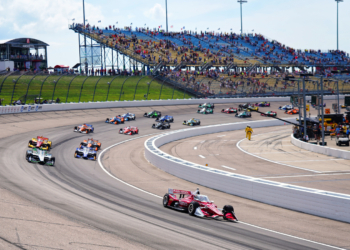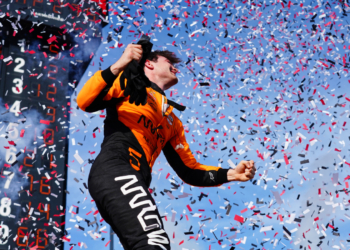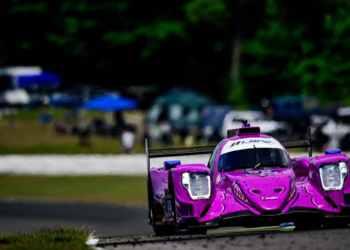ITR, the DTM's parent organization has unveiled a conceptual vision for a revolutionary all-electric racing series, which the organization says could co-exist alongside the DTM format.
According to the concept, the series would the supply of energy from two different sources – regular battery, already used in many electric/hybrid vehicles, or fuel cell technology, which transforms hydrogen into electrical energy. With a high-performance electric powertrain, ITR believes the cars would be able of power outputs exceeding 1000 bhp and capable of achieving top speeds of 300 kph (185 mph)
Another eye-catching aspect of the ITR's concept involves the way pitstops would be conducted: large industrial robots would be used to replace the wheels and replace the battery pack or hydrogen tank located in the car's underbody. DTM already has mandatory pitstops for tyres, but with the electric format, each car would also be stopping for fresh power.
The batteries and hydrogen tanks would likely be incorporated into the cars' underbody for ideal weight distribution, with the option for quick removal and replacement during the mandatory stops.
"This is a courageous and innovative concept", said ITR Chairman Gerhard Berger. "You have to look far ahead if you want to shape the future of motor sports and offer racing with alternative drive systems that inspires the fans. It is obvious that manufacturers who want to become involved in motorsport are increasingly focusing on alternative drive concepts."
The concept would see an all-electric series initially launched in a supporting role to the DTM, which is already taking steps into the future with a more environmentally friendly fuel formula as well as a planned introduction of hybrid technology in 2022. ITR is continuing with a feasability study, but is already saying that the project could only be feasible through collaboration with a single-source supplier, to ensure technical parity and efficient cost controls. According to ITR, the electric drive system would be largely standardized.
ITR believes that the series would be attractive to manufacturers because they could enter cars that resemble their road-going models. According to the organization, the high performance nature of the series would also allow provide manufacturers with an opportunity to explore and develop high performance electric road cars.
"The DTM is a professional, international motor sports platform for vehicles with a clear connection to series models," Berger added. "It has existed for more than 30 years, is highly popular and has strong traditions."
According to the concept vision, the introduction of a project this scale would depend on three factors: technical feasibility, financial viability and fan, manufacturer and sponsor interest.
"You have to look far ahead if you want to shape the future of the sport," the Austrian continued. "Although hybrid and electric vehicles have established a foothold in the market, I think that a truly new and inspiring concept has been lacking up until now. In addition to millions of motorsport fans worldwide, we're now talking with a large number of automotive companies and suppliers who would like to become more involved in motorsport.
With this project, we want to demonstrate that we're open to what the future holds and that we have something new to offer the world's manufacturers."






